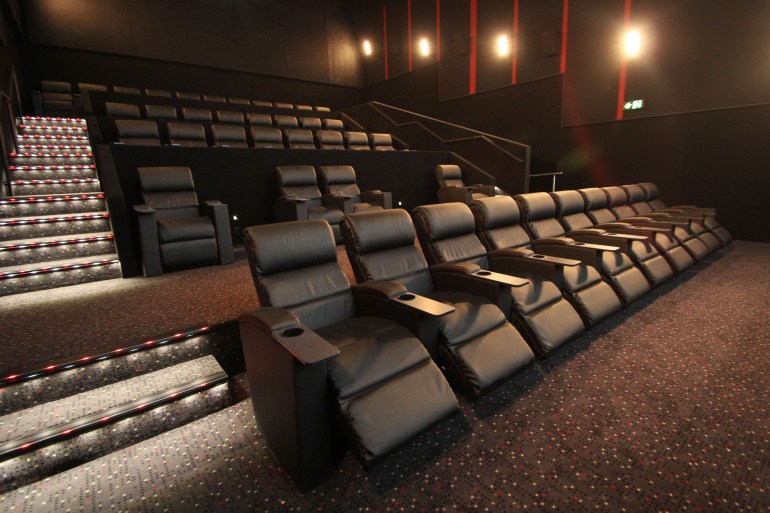Hoyts Recliners.
Admissions at Australian cinemas have been flat or falling for 15 years, interspersed with a few upticks–despite hikes in ticket prices, the addition of new screens and an annual net population gain of 300,000.
That’s according to Screen Australia research on the exhibition sector. Despite the overall drop in attendances distributors and exhibitors insist the theatrical business is still very healthy in the face of myriad competing leisure time choices including Netflix and other streaming services.
However they acknowledge that discounting as low as $10 a ticket initiated by Reading Cinemas, which forced cinemas in the same catchment areas to follow suit, is harming revenues.
Village Cinemas chief operating officer Gino Munari tells IF, “The market is still robust. We do want to drive admissions but we focus more on the total box office and providing a quality product in terms of screens, service and comfort.”
After attending the Independent Cinemas Association annual conference last week, Cinema Nova general manager Kristian Connelly said: “I am genuinely enthusiastic about what I see coming to cinemas, both for commercial multiplexes and the arthouse market.
“Audiences will see a greater focus by exhibitors on providing a wider variety of product on screen, except where key blockbuster releases see screen space dominated by a single release in the service of the largest number of sessions.
“The Walt Disney Co., through their Marvel, Lucasfilm, Pixar, Disney live action and Disney Animation output, has shown rival studios a pathway to previously unimaginable riches. It will be this ‘unmissable big screen spectacular’ approach that dominates the years ahead, with second tier films skewed to mop up retiring boomers, femme-specific, family, minority and other audiences.”
Universal Pictures MD Mike Baard said: “We will try to do everything we can to make going to the cinema as attractive to the consumer as possible. What we can’t do is give someone an out-of-home experience that looks the same as they get at home.
“We do want to increase admissions but people won’t pay $25 to go to some of those middle-ground movies when they can see them on Netflix for $14 a month.
“That’s why exhibitors are investing in the comfort of the cinema experience and what you see on screen. So if ultimately we are seeing a decline in admissions we can offset that from a revenue perspective by getting people to spend more on a basket of items.”
Wallis Cinemas’ Bob Parr said: “My personal view is as long as we keep our cinemas clean, comfortable, technically up-to-date and welcoming we will win.
“Obviously we are all reliant on product and as was emphasised at the ICA conference, diversity in offerings including alternate content is important for cinema, even if they don’t make a lot of money.”
According to Screen Australia, the Australian BO fell by 4.6 per cent to $1.2 billion while admissions dropped by 6.9 per cent to 85 million last year.
The number of cinema screens has risen more than 150 per cent, from 829 in 1980 to 2,210 last year. In that period the country’s population has ballooned from 14.7 million to 24.6 million.
In 2017 the average ticket price (ATP) edged up from $13.80 to $14.13, the research showed, an assertion which some industry executives challenge. In fact they believe the ATP has fallen in the past few years due to discounting.
As attendances are calculated by dividing total grosses by the ATP, some execs believe attendances were actually higher than 85 million and per-capita admissions were closer to 3.8 than the 3.5 stated.
Hoyts Group CEO Damian Keogh acknowledges the dip in ticket sales is worrying but he points out the per-capita rate is still amongst the highest in the world.
To try to stem the drift in moviegoing among young adults Hoyts is partnering with Gfinity Esports Australia to convert some cinemas to esports arenas around the country, starting with Hoyts in Sydney’s Entertainment Quarter.
Village Cinemas has refused to enter the discounting wars. “We want to preserve the integrity of our pricing, which is commensurate with the quality of the films which can cost up to $200 million,” Munari said. “We regard discounting as lazy marketing. The industry is getting into a dangerous continuum: Where does it end?”
Connelly agrees, stating: “We have all witnessed the discounting occurring in various marketplaces. I hold grave concerns for this race-to-the-bottom approach, particularly when it comes to the unavoidable impact it will have on locally made content.
“As an exhibitor who screens films that span the most extreme breadth of the production-budget spectrum, Cinema Nova understands that audiences value Blade Runner 2049 and Ali’s Wedding comparably; both considerable box office hits at Cinema Nova, they were separated by only two places in the ranking of all films released in 2017.”
Connelly attributes the burgeoning growth of streaming services as a contributing factor to the BO decline last year and is convinced Foxtel’s screening of Game of Thrones impacted ticket sales in July/August.
Majestic Cinemas CEO Kieren Dell cites piracy as the main challenge to the cinema business despite the success of the Federal Court’s piracy site-blocking orders sought by Village Roadshow and Foxtel.
Dell added: “Indiscriminate and poorly targeted discounting has the potential to undervalue the offering, especially given the capital costs in building and refurbishing our cinemas. I don’t think streaming has a direct impact but the indirect impact is the range of movies available in cinemas and the change it prompts in consumer behaviour and expectations. Even in regional areas consumers now have an expectation that content is available immediately and when they want it.”



